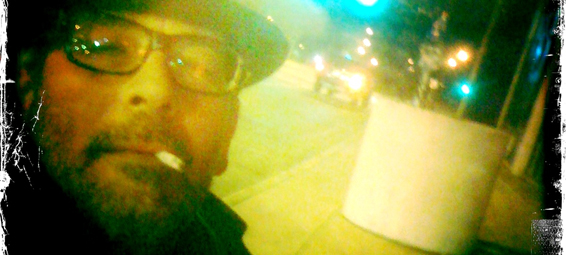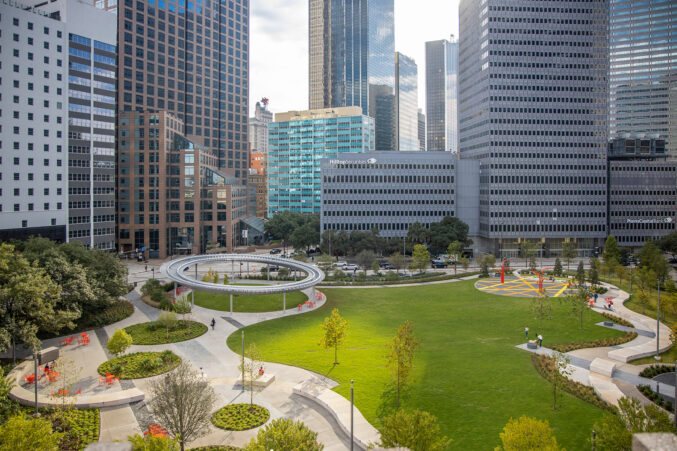This story originally appears in the October issue of D Magazine.
It’s a dwindling late august afternoon, and I’m standing in the shade outside the door of The Ochre House, a little storefront theater on a leafy block of Exposition Boulevard, near Fair Park. The theater was founded by Matthew Posey, one of Dallas’ more idiosyncratic and enigmatic theatrical figures. I knock on the door and wait. Out in the street, it is still bright and hot. When the door finally cracks open, a thin, bearded white face emerges from the dark interior like a sugar cube bobbing to the surface of black coffee.
“Matthew Posey?” I ask.
“No, he’s around the corner,” the man says. “Come in. I’ll go get him.”
I step into the cool room, a big, open space, dimly lit, strewn with chairs and folding tables. The front windows are covered, and along the wall there’s a beat-up lavender sofa and a waist-high counter with a cash register. On the far side of the room, a mess of sticks is threaded together in the vague shape of a miniature human—a puppet, tacked by its strings to the wall. I navigate around some chairs and a little nipping dog at my feet. There’s an odd smell in the air (dust, sweat?), and bits of instruments are scattered everywhere like doll parts: a violin bow, a black flute case, a red guitar body leaning against an amplifier. In the back of the room, an elevated wooden platform features a tattered dining room chair and an unmade bed with a sheet dangling from mattress to floorboard like drapery in a portraiture studio. Perhaps it’s my imagination, but the whole place reeks of sex.
For a store, a loft apartment, a bar, a band’s practice studio, or a swinging party pad, the Exposition storefront is spacious and well-suited. The Ochre House serves all these functions, but first and foremost it is a theater. And not just any theater. Since 2008, this makeshift 50-seat house has staged only the plays of a man whose work ranges from 2009’s Coppertone, which showcased foulmouthed, mentally ill Muppet-like creatures trapped in a perverse sanitarium, to 2011’s The Butcher, a penny opera macabre comedy about a singing serial killer. Sometimes Posey’s work explores the biographies of his artistic heroes, people like Hunter S. Thompson, William Burroughs, Frida Kahlo, and Charlie Manson. Often they employ puppets, sometimes in decidedly adult roles, other times as psychological manifestations or man-eating monsters. Plays at The Ochre House nearly always include love, sex, booze, pills, musical numbers, plenty of humor, and a healthy dose of morbidity.
For the first couple of years after Posey’s playhouse opened, it was seen as a fresh, albeit inconsistent, addition to the Dallas theater mix, sometimes overly crude and scatological, critics wrote. But over the past two seasons, Posey’s madcap theater and its close-knit troupe of actors have turned out some of the more interesting and adventurous work in the city. In 2011, the DFW Theater Critics Forum named Posey’s Morphing, a deconstruction of Eugene O’Neill’s Long Day’s Journey Into Night, one of the year’s outstanding new plays.
I’m alone in The Ochre House with the little dog for two or three minutes before the director comes in through a back door that doubles as entrance stage left. Posey’s a tall man, in his mid-50s, wearing black shades and a fedora over his clean, bald scalp. He greets me with a grin and gravelly hello. As we sit on two orange swivel chairs, he takes a pack of filterless Camels from his pocket, and I bum one.
“I’m afraid if I go to filters I’m going to die,” Posey says, flashing that grin again.
“Is there voodoo in that?” I ask.
“I tell you, when you’re in the theater, everything is very superstitious.” He laughs with a pitched wheeze.
We chat about his biography: born in El Paso, grew up in Lubbock, graduated from Texas Tech, landed in the youth company at Houston’s Alley Theatre in the late 1970s. “The worst two years of my life,” he says, adding that they coincided with the last time he tried to quit smoking. At the Alley, Posey met another young actor, Raphael Parry, who was headed up to Dallas to start a theater with a young director named Katherine Owens. Posey followed. He acted with Owens’ Undermain Theatre before eventually opening his own space, The Deep Ellum Theatre Garage, which operated until 1990, when Posey, presumably chasing what all actors at some point feel they must attain—celebrity—moved to Los Angeles. There he acted bit parts, wrote screenplays, and earned a master’s degree in directing and screenwriting from the American Film Institute. Twelve years later, he found himself back in Dallas, wandering Exposition Boulevard, looking for the next chapter in his life.
“I told myself if I didn’t meet anyone,” Posey says, “I’d move on.”
He did meet people, and one day he saw a little Buddhist figurine attached to the lintel of an Expo storefront. He took it as a sign, rented the space, and opened his theater.
Posey speaks about Dallas in a way few people do. It is a city with heaps of unrecognized talent, he says. It is a place where you can innovate, flesh out your vision without compromise.
“It’s not in an eddy, like in Austin, where everyone plays the same thing,” he says. “In Dallas, there seems to be more of a purpose. It’s almost a hermitage of pursuit.”
Asked what “hermitage of pursuit” means, Posey says an artist’s practice is an egocentric, but not egotistical, pursuit that requires feeding one’s own understanding of the world, a process that demands a tremendous amount of solitude. Solitude is something easy to come by in Dallas, but as much as The Ochre House has become a setting to manifest the peculiar imaginations that ferment during Posey’s solitude, it has also become a kind of flophouse for the artists—actors, painters, designers, musicians—that Posey gathers around him to help refine his collaborative plays.
“We’ve had as many as 10 people crash out here for a week, two weeks, a month. They’re all artists,” he says. “But there is also a maddening side. Sometimes it is just a big f— bowl here. Sometimes it is just craziness, just a finger-banging f— bowl. But that’s part of it, too.”
Perhaps Posey’s greatest achievement in the name of artistic freedom has been his board, a collection of old friends who, he says, understand his vision and help put together the meager budget without inhibiting the creative side of the theater. It’s not an easy job, but then The Ochre House isn’t operating with much money. The inspiration for the theater comes from experimental Polish director Jerzy Grotowski’s book Towards a Poor Theatre.
Posey’s vision for The Ochre House is rooted in his experience of Dallas in his 20s. Back in the early 1980s, the city boasted six equity theaters, and he could find full-time work as an actor by bouncing among them.
But acting wasn’t always Posey’s primary pursuit during his early Dallas days. For a while after he arrived, Posey was a student at Christ for the Nations. He got kicked out when his superiors discovered that he and his wife had separated. But when I first ask Posey about this incident, that’s not how he explains it.
“What got me kicked out of seminary,” he says, “was that I thought the place for God to hide was behind the Devil.”
What do you mean?
“Satan,” Posey says. “I don’t see him as the horned devil.”
Posey takes a drag from his cigarette and leans back in the orange chair. He starts talking about suffering and personal demons, about how his happiest times are times of crisis and how he finds himself going mad when things are going well. He quotes the Essene Gospels. He says we all must suffer, that we all need to learn to laugh at ourselves, that God is the guy at the end of the bar laughing with us.
“I think the most evil thing,” Posey says, taking a long pause to measure his words, “is when the world comes out from underneath you, when suddenly someone clips your knees, and you find yourself in a new situation. These are the true lessons. This is what theater writes about.”
The Ochre House’s latest production, Party Mouth, is on stage through September 29. Photo: Matthew Posey (Courtesy of the Ochre House)






